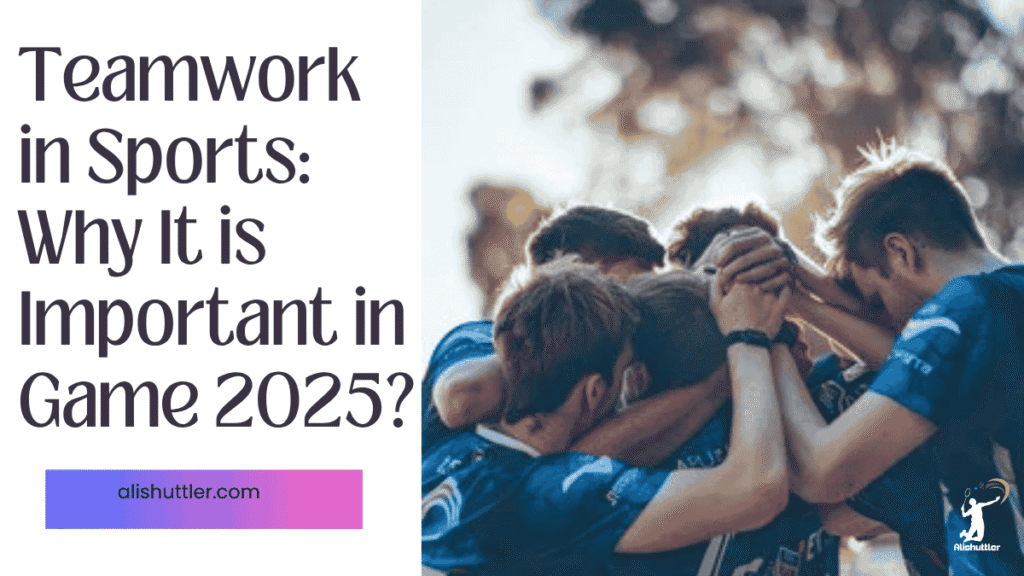Teamwork in sports implies players join forces to strive for a common objective. Every single player has talents that assist the entire team to win games, manage pressure and repair errors quickly. Trusting teams tend to display superior performance, greater cohesion, and defined on-court playing roles.
In numerous sports, coaches use team-building exercises to increase cohesion and maintain interest. The following paragraphs describe how teamwork impacts sports.
The Core Synergy

Synergy in team sports signifies that players’ collective efforts can accomplish objectives that no individual athlete could attain by himself. This is feasible through each individual’s ability to play with, an aptitude that enables them to enter rapid-shifting chains of collaboration. When players connect their movements, such as setting up a volley in volleyball, they access collective affordances, where one player’s movement opens up possibilities for another.
This type of coordination allows a team to become a cohesive unit, frequently outperforming opponents who act more as individuals than a collective.
1. Amplified Performance
When team synergy is strong, the group can blend each member’s best attributes, which enhances the team as a whole. For instance, in soccer, a striker depends on defenders and midfielders to generate scoring opportunities. Joint drill practice sessions assist players in reading each other’s moves and enhancing tactical plays in competitions.
When there’s a culture of shared responsibility, then everyone is aware of their role, and they feel as though they have a stake. This collective ownership drives teams to be at their best, particularly when it matters most, such as during tournament finals. In these moments, the gang’s hustle frequently produces magic, demonstrating synergy’s true amplitude.
2. Psychological Resilience
Teams that support each other form a mental strength that’s hard to shatter. When teammates support each other following errors or defeats, it builds confidence and faith. A rugby team, for example, can come together after a failed play, flipping frustration into concentration for the next.
Coaches can establish rituals where players openly discuss failures and extract lessons, assisting the entire team to recover. Gradually, this crew mentality of refusal to surrender allows athletes to confront difficult periods as a unit and emerge more powerful.
3. Strategic Advantage
Collaborating as a group enables players to execute these intricate maneuvers that an individual on his own can’t handle. In basketball, a well-timed pass or screen can open up space for a shot. Players who share what they see during a game help the group make smart, on-the-fly decisions.
Coaches craft plans around every member’s strengths, allowing the team to respond quickly to new challenges. After games, a lot of teams watch film as a group, trying to figure out what they can do better for next time.
4. Sustained Motivation
Acknowledging small and big wins boosts morale. When all, not just the star gets acknowledged, it cultivates pride and motivation. Teams frequently set short and long term goals, which keeps everyone engaged.
Small compliments and sincere critique from teammates set a positive atmosphere. Activities off the practice field, such as group dinners or volunteer work, can assist in maintaining motivation.
5. Personal Growth
Teamwork constructs more than game skills. It teaches athletes to communicate, collaborate, and cooperate. Youngsters assuming leadership duties, such as conducting warmups or delivering pep talks, become more confident.
Simple check-ins where players reflect on what worked or what to work on next time nudge consistent growth. Teams that allowed each player to pursue their own objectives—yet still contribute toward team objectives—create the foundation for balanced development.
Building Cohesion
Cohesion in sports teams arises from a common purpose, faith, and collaboration accumulated over time. When players work toward a common goal and respect one another’s roles, the team becomes more cohesive, determined, and resilient. As discussed earlier, team building skills and interventions, which we found to have a moderate effect size on cohesion (ES = 0.65, 95% CI = [0.40, 0.91]), serve as effective tools for coaches and players looking to foster effective teamwork.
Shared Goals
A team begins to gel when all of its members know what they are working towards. Teams that take the time to map team objectives with individual player objectives generate a strong sense of purpose. Goal-setting exercises get everyone on board, set clear targets, and raise commitment.
This is particularly beneficial for younger athletes in the 15–20-year range, where team-building techniques have the greatest influence. Teams that return to their common objectives frequently can adapt to emerging obstacles and maintain alignment, so nobody loses track of the overarching mission. Commemorating team landmarks — even the small victories — can provide players with a sense of cohesion that’s difficult to crack.
Defined Roles
Having defined roles on a team makes the machine hum. When every player knows their role, responsibility rises and ambiguity falls. Long seasons require team huddles to discuss roles, particularly as team demands evolve.
That’s how players learn to be proud of their individual position, be it captain, defender, or support. In the field, coaches are able to highlight how each position connects to the team’s triumph. Occasional reminders during drills or after games do the trick in keeping everyone on point.
Mutual Respect
Respect is far more than being nice! When players feel appreciated, they sweat it and believe in each other. Teams with members from diverse backgrounds may realize displays by naming each other’s strengths.
If conflicts arise, they should be resolved immediately, before things escalate. Respectful coaches and leaders establish the standard for the others. In groups under 20, building respect can be simpler — small teams have a greater likelihood of enduring cohesion.
Consistent Practice
Practice is where the team work gets real. Frequent practices allow players to learn one another’s moves and timing. Throw in some team-building games or trust drills and you can do wonders, especially over two to twenty weeks, the optimal time frame for results.
Touching base on how practice is going and tweaking little things keeps everyone involved. When all teams arrive and participate, building cohesion increases. Cohesion tends to drop off as the season progresses, so consistent focus is required.
Leadership’s Role
Leadership defines how a sports team collaborates, maintains spirit and achieves objectives. Surely coaches and captains lead the pack, but leadership from anyone in the group can occur. Great leaders make teams more cohesive and self-assured, and as a result, more effective.
Teams that develop leadership skills in all members, not simply the designated leaders, are more adaptable to their needs and the situation. Leadership development is best when it’s both individual and group.
Coach’s Vision
Coaches have a huge responsibility. They establish a vision that unifies what each athlete desires with what the team requires. A coach demonstrates this vision in the way they discuss goals and organize practice sessions and dissect strategies.
When players understand what’s expected, such as how to win a match or deal with a hit, they’re more apt to trust one another and collaborate. A coach’s enthusiasm infects the team. When players witness authentic dedication, they tend to mirror that enthusiasm.
For instance, coaches that arrive early, notice the details, and recognize minor victories keep sportsmen on track and inspired. Coaches can employ various styles to achieve results. Some may be more hands-on, others might allow players more autonomy.

What counts is that the strategy suits the group and gets people to want to participate.
Captain’s Influence
Good captains truly matter. They lead from the front, arriving early, staying late, hustling and backing up teammates. This type of leadership can elevate the entire team and establish confidence.
Whether it’s a captain who remains positive during difficult matches or one that owns up to errors, keeps the squad accountable, captains play a crucial role. Captains additionally facilitate group discussions. If somebody feels ostracized, the skipper can intervene and hear.
When issues arise – like disputes over strategy or minutes – the captain frequently assists in reaching an equitable resolution. This keeps the team engaged and cohesive.
Mentoring for captains is essential. Coaches can lead captains with feedback and training, which enhances their leadership skills as time passes. Not every leader wears the armband: some athletes lead by speaking up in the locker room or pushing the pace in practice.
When teams back these informal leaders, all win.
Communication Channels
Great team work in sports is a function of communication. Effective communication channels keep teams aligned, overcome challenges, and achieve collective successes. They facilitate open discussions, provide feedback, and utilize real-time mechanisms to keep everyone updated.
By establishing a blend of face-to-face and online channels of communication, teams can avoid misunderstanding and collaborate more effectively.
Verbal Cues
Well articulated words on the field during play keep you all moving as one. Teams coach players to communicate in short, direct phrases so there’s less opportunity for errors. For instance, in football or basketball, yelling out screens, switches, or ball direction during play can alter the course of the game.
The teams that take time to review these cues in practice experience less miscommunication in games. Players should never hesitate to speak up, whether in the heat of a moment or during a pause. Coaches can cultivate this comfort by allowing everyone to speak at team meetings.
These rapid, verbal updates assist teams in adapting immediate tactics, particularly when conditions shift quickly on the ground.
Non-Verbal Signals
Not all communication is spoken. A nod, a hand signal, or a glance can go a long way in a match, particularly in vociferous stadiums, or when time is of the essence. Squads practice to identify and employ these signals, ensuring every athlete understands what each motion signifies.
For instance, a light tap on the shoulder in volleyball could signify a change in defensive positions. Trust body language confidence spreads. Teams that give high-fives or thumbs up stick together in hard times.
Eye contact comes in handy when players want to indicate a strategy without alerting the opposing team. Over time, these non-verbal habits cultivate close connections and make collaboration instinctual.
Constructive Feedback
Teams thrive when players and coaches exchange sincere, constructive communication. It’s critical for us all to master the art of constructive feedback give and take, in a manner that enhances the entire collective. They can establish weekly feedback sessions or what went well and what can change for each game.
Individual conversations provide an opportunity for students to pose questions or offer thoughts they wouldn’t otherwise express in the group setting. Peer feedback is just as critical.
When teammates provide one another with advice, it can seem less professional and more motivating. It does wonders for building trust, inspiring innovation, and maintaining a collective obsession about improving, as a team.
Beyond the Field
Sports teamwork is about more than just victories; it involves effective teamwork that fosters cooperation and develops life skills. The camaraderie of working with others enhances team dynamics and builds strong team cohesiveness, forging character and connecting athletes to one another and the world beyond sports.
Life Skills
Sports teams teach players to speak up, listen and collaborate with all manner of individuals. In numerous nations, these capabilities count on and off the field. Student athletes catch employers’ attention because they understand how to think critically, manage a team and perform under pressure.
They’re more than just sports skills–they assist in business, school, and life. Teamwork in sports provides athletes with a protected environment where they learn about structure, discipline, and trust. When players pursue a coach’s scheme or assist a teammate, they become more patient.
They learn to sacrifice for the team. For a lot of people, this is a lesson in respect, not only for the rules but for other peoples’ work and experiences. For a few, team sports even alter their worldview. In less sports-minded cultures, such as Asian American families, signing up for a team can change antiquated norms and instill the importance of a study/work/play balance.
This turn, of course, is often advocated by parents who view athletics as a means to mature children not just as an “escape” from academics.
Mental Well-being
A strong team gets players through the hard times. When athletes are candid about stress, pressure, or mental health, it normalizes it and makes all of us feel less alone. Certain cultures anticipate individuals figure things out on their own, in sports or in life.
Teams that have each other’s back can disrupt this pattern. Discussing mental health, sharing stories, and checking in with one another creates trust. Lots of teams bring in counselors or coaches educated in identifying stress indicators.
Players learn to watch for one another, not just for injury, but for signs that someone is feeling down or anxious. These habits help individuals manage setbacks, whether they’re on or off the field. The lessons learned, such as how to request assistance or provide it translate to home and professional life.
Community Impact
When teams lend a hand in their communities, they demonstrate that the teamwork doesn’t stop at the final whistle. Other groups participate in local service projects, mentor youth or operate sports clinics. This work builds pride in the team and brings players closer.
In Asia, where sports programs tend to be government-run and athletes are viewed as civil servants, these service projects can demonstrate an alternative flavor of teamwork—one that spans bridging communities. Athletes have often been role models, particularly for youth who don’t see too many players who look like them.
In contexts where athletics is not perceived as a primary objective, witnessing an achievement of the individual as a member of a team can be transformative. In cities and towns, teamwork can spark and bond.
Future of Teamwork
Teamwork in sports is evolving as technology, data, and how we compete transform. Effective teams and coaches encounter new challenges and means to collaborate, emphasizing data, remote coaching, and adaptive team roles, which are critical for team dynamics and overall success.
Data Integration
Teams are leveraging this rich data to assist coaches in selecting optimal strategies and directing player development. Wearables and tracking systems tee up stats like speed, heart rate, shot accuracy. These datapoints enable teams to identify where additional assistance is required and what competencies are in need of development.
In football, coaches leverage this data to design intelligent plays and avoid injuries. When competitors share and compare their own stats together, they observe where they fall and how they can contribute to the team. This instills trust and a feeling of collective purpose.
Clubs that install dashboards or apps to monitor team progress are then able to identify patterns quickly and adjust training. Data-driven is no longer a nice to have—it’s now a fundamental ingredient in creating more powerful teams.
Virtual Training
As sports turn global, teams are distributed. Virtual platforms allow coaches and players to connect even when they’re miles apart. Video calls, shared workouts, and online playbooks keep everyone on track.
Other teams employ video games or virtual reality to develop team cohesion and maintain a playful edge in practice. These tools imply that even busy or traveling athletes can remain connected to teammates.
The trick is to mix new tech with old-school collaboration habits, so nobody gets excluded. Flexibility in meeting times and workout types allows achieving the balance among athletes with different backgrounds and home life situations. It’s a way to keep team chemistry alive in a world in flux.
Evolving Dynamics
Teamwork is no longer about marching to the tune of a single leader. A lot of winning teams distribute leadership, assigning various players responsibilities such as task leader, motivator or social connector.
This shift serves teams with short-term players think college basketball teams where players leave early. In youth sports, it’s hard to foster those resilient connections when kids move from team to team, but providing more players with leadership skills can help fill that void.

Other sports, like football, remain ingrained in the team culture because of long seasons and consistent rosters. According to their research, developing a shared team identity with the help of leadership training and fresh ideas makes teams more agile and future ready.
Final Thoughts
Teamwork defines every play, every win. They establish trust, shoot straight, support each other. Coaches lead with defined roles and consistent encouragement. Great teams bond on and off the field. Excellent teamwork transcends scoring goals. It makes players mature, be resourceful and resilient in the face of pressure.
Even as sports evolve rapidly, the fundamentals remain universal. Teams who share, plan and stay open find more winning ways. To stay teams strong, talk frequently and grow one another. Want your team to reach the next level? Leave things open, honest and clear. Experiment with new methods to cultivate trust and discover your shared reach.
Frequently Asked Questions
What is the importance of teamwork in sports?
In sports, effective teamwork enhances performance, fosters trust among teammates, and facilitates the pursuit of shared objectives, enabling players to back one another and collectively adjust to adversity.
How can teams build cohesion?
Teams develop unity through effective teamwork, common objectives, habitual practice, and transparent communication. Powerful ties develop when players admire and believe in one another, fostering team cohesiveness and improved outcomes.
Why is leadership important in sports teams?
Effective leaders inspire the team, set an example, and foster team cohesiveness by helping settle disagreements while ensuring each player feels appreciated and involved.
What role does communication play in teamwork?
Effective communication enhances team dynamics by allowing players to coordinate plays, exchange strategies, and prevent confusion, ultimately increasing overall success and fostering effective teamwork.
How does teamwork benefit athletes beyond the field?
Teamwork imparts essential life skills such as collaboration and effective teamwork, critical thinking, and compassion, fostering team dynamics that serve athletes well in school, work, and their personal relationships.
What are effective ways to improve teamwork skills?
Teams can enhance effective teamwork through practice, defined roles, and feedback, fostering team dynamics and overall success.
How is teamwork in sports evolving for the future?
Teamwork is evolving with tech and analytics, emphasizing effective team dynamics and encouraging teamwork for sustaining overall success.






